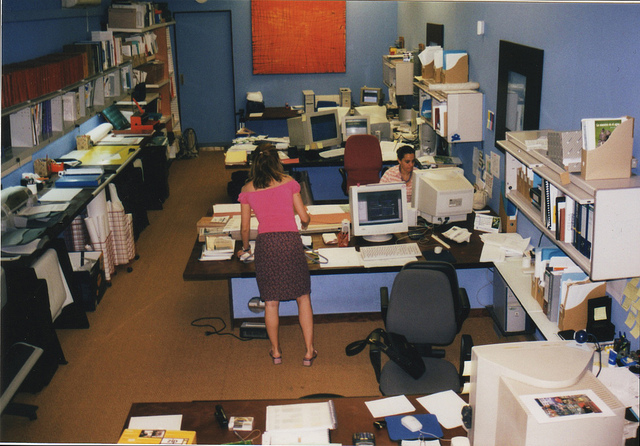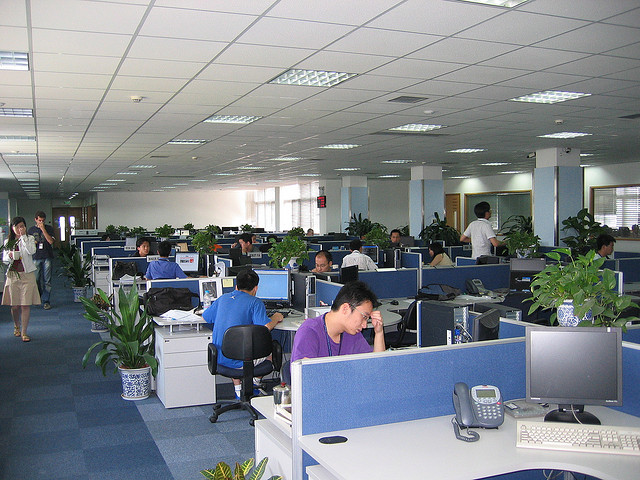
1. Pick up a new language
This is one of the most obvious advantages to working abroad, yet conversely it is also one of the biggest deterrents. Naturally, people are afraid of working in a country where a different language is spoken to their own and assume that you need to be proficient in the language in order to work. This is not necessarily the case — take teaching English as an example — armed with a TEFL qualification there are lots of English teaching opportunities around the world for native speakers. If English isn’t your first language then don’t let that stop you either. There are plenty of jobs that require only a basic understanding of a language, such as farming and other manual or skill-based work. There are also lots of companies who offer language classes for their employees, particularly if you are on a sabbatical. The important thing is to get your foot in the door. All you really need is a basic grasp of the language to get by for the first couple of months, after that you will be surprised at how fast your language skills will improve. When you are in a working environment and are forced to learn the language your brain goes into survival mode and through the basic process of socialization your mind will be much more efficient in committing language to memory. The extra language skill you will pick up will give you a great advantage on the job market when you get home. Also, the great thing about learning a language in a job environment is that you get to learn a whole range of job specific vocabulary that you might not otherwise. This gives you an added advantage over those who already know the language but who do not know the market specific vocabulary that you will. So don’t let a lack of proficiency in a language put you off working abroad, throw yourself in the deep-end and the results will be worth it.

2. Learn to eat like a local
You might say you could do this by simply visiting a country and knowing the right places to go without actually having to work there. This is indeed a possibility; however there are specific advantages to working in a country when it comes to insider knowledge on local cuisine. When you are on holidays you tend to eat in a different way than you would if you were at home. You spend more money on meals and they become a little more indulgent and elaborate, this doesn’t happen when you are living and working somewhere. If you are working somewhere that is relatively cheap for eating out then you might head to a local coffee shop near your work for lunch. This might be recommended to you by a colleague or you might find it yourself and you might become a regular here, which is always nice. Also, if your work is located away from the main tourist trail, the places you lunch are likely to be more authentic and local by default. The second option is the packed lunch. Again, on holidays we rarely hit the supermarket for lunch meals and if we do, they are likely to be tourist geared shops. When you work somewhere you have more time to find the best value and best quality food shops and you can experiment with different foods you are unfamiliar with, trying out different things over time. You can also observe what your colleagues bring to lunch and get some tips from them. Another way of learning culinary skills from colleagues is in the inevitable invite to dinner. Most cultures have food-related work parties either at restaurants or someone’s house and this is where you will pick up come great local recipes.

3. Gain market advantage
When you work in another country it gives you an insight into how your career field operates in other parts of the world. No matter what your job is, whether it is manual or skill-based; uses technology; is based in science or arts and culture; or is vocational such as teaching, you are bound to learn something valuable. If you do an internship abroad you might learn a new way of doing things, a new innovative method you hadn’t thought of; you may learn about a new product or programme; or a how to use a new piece of equipment. You will see how your competitors work and you will gain an understanding of the needs of a foreign market. This will put you miles ahead of your colleagues once you return home.

http://www.flickr.com/photos/gabrielamadeus/6490236571/sizes/z/in/photostream/
4. Meet people easily
It can be hard to meet people when you travel, especially if you move around constantly and spend short periods of time in different places. It also gets harder to keep making an effort to socialize every time you relocate. This is why combing travel and work abroad can be a great way of meeting people. Most people’s social groups are made up of their work colleagues once they leave school. Work drinks are an integral part of lots of cultures and work bonding activities and trips away are becoming common practice among employers and big companies as a way of team building. In a work environment you are guaranteed to have at least one thing in common with your colleagues, your job! They are also likely to be a mix of age groups and genders, as well as backgrounds. If you work for an international company you can meet people from all over the world. You will not only gain new friends but you can also make important business contacts this way too.
5. Money gives you freedom
Money can be a big restriction when travelling. You want to do everything while you are in the destination: eat out, visit the tourist attractions, travel to the outskirts/ off-the-beaten track locations, use the transport, maybe hire a car – all of which can be very expensive if you do it all in one go. However, when you work in a location for a longer period of time you can break all these things up over the duration of your stay whether it’s for 6 months or a year and budget accordingly. You will know how much you will be making per month and how much you need for your rent and then you can divide your disposable income so that you can go on a certain number of excursions while you are there. Use those work colleagues of yours again to make things even cheaper and more enjoyable. You could carpool sharing on petrol and car hire expenses. Also, if they are local they will know all the best places to go, how to get there and will be using the lingo once you are there to find all the best eating spots etc. A definitive winner!

http://www.flickr.com/photos/luke-ekblad-photography/4836279191/
6. Get Insider Knowledge
Insider knowledge comes in all forms, you could say that everything I have mentioned above is a form of inside knowledge – and it is! Working and living somewhere gives you invaluable inside knowledge into a location. This is not only embodied in food, language and industry insight, it can be found in the monotony of everyday working life. Working life is a different kind of life to the glamorous life of back-packing. There are lots of less exciting things that come with working such as boredom, repetition, frustration, colleagues who irritate you, bosses who drive you mad, long hours and stress. However, this is part of every day modern life and in order to really understand a culture it is important to live exactly as a local does, embracing the good with the bad. By getting up and going to bed at the same time, sticking to a routine and immersing yourself in the repetitive flow of everyday life you will gain the real feel of a country. You will also end up using the services everyone else does, from health care to public transport, this is an invaluable way of experiencing a place and a culture.

Bio: Jessica Kitt writes about working, volunteering and internships abroad for SC Travel-n-Work, providers of working opportunities abroad. She has worked and volunteered in different countries around Europe and South America and strongly encourages other people to do it too.
![]()




